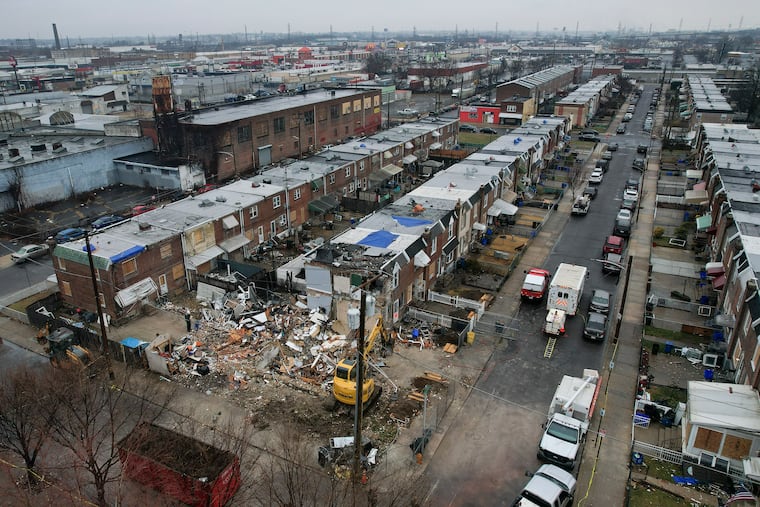What you need to know about natural gas safety in Philadelphia
Preliminary findings indicate an explosion in Port Richmond was not the result of a leaking natural gas main. Who's responsible if your house explodes? What to know about gas lines, PGW and safety.

The new year began with devastation for families on a Port Richmond block after an explosion leveled three homes and injured five people.
The city is still investigating the cause of the explosion, but preliminary findings appear to indicate that it was not the result of a leaking natural gas main operated by Philadelphia Gas Works, a common problem in a city with some of the oldest utility infrastructure in the country.
» READ MORE: Port Richmond explosion site had no gas leaks, according to PGW’s initial survey
Investigators may take as long as a year to reach a conclusion on what happened on the 3500 block of Miller Street. In the meantime, here’s what you need to know about natural gas safety in Philadelphia:
How to stay safe
PGW manages the network of natural gas pipes that run throughout the city. But the utility’s responsibility ends at each property’s gas meter, and it’s up to owners to ensure their homes are safe.
The most important sign of a natural gas leak inside the home is the gas’ distinct odor, an artificially added “rotten eggs” smell. Bob Ackley, owner of the consulting company Gas Safety USA, said anyone who smells this odor in their home should call 911 immediately.
“Get the Fire Department down there to check things out,” Ackley said.
If gas odors are suspected, residents are urged to leave the premises immediately.
It’s also recommended that residents do not light any matches or candles if a leak is suspected. Electrical equipment, light switches, doorbells, thermostats, and appliances should also not be used until the gas company or Fire Department deems the area safe.
Outside the home, potentially hazardous gas leakage is harder to track. Ackley said rapidly changing temperatures during the winter are when cracks in underground gas mains are most likely to form.
During these frigid transitions, water under the ground freezes and pushes soil upward, damaging the pipelines. For cities like Philadelphia, with aging systems and a large share of cast-iron pipes, the risk of winter cracking is more pronounced.
“The danger of these old systems is that small-diameter cast-iron pipes that are susceptible to cracking and earth movements, which is basically frost,” Ackley said.
Anyone who suspects a gas main leak outside of their home is urged to call their gas company immediately.
Aging infrastructure
The Port Richmond explosion appears to be unrelated to the city’s aging network of natural gas pipes, which have been linked to home explosions in the past.
But that issue remains of key importance to the city and PGW, which has sought in recent years to quicken its pace of replacing brittle cast-iron mains with new PVC ones.
PGW had more than 1,200 miles of cast-iron mains as of last year, including more than 800 miles installed before 1930 and more than 250 miles dating to before 1900, according to Pennsylvania Public Utility Commission records from August.
PGW has declined to share the locations or maps of the most dangerous or oldest mains in the city, citing safety concerns.
As of last year, about 56% of PGW’s mains were considered “at risk,” down from 62% in 2017, according to a report PGW submitted to the state Office of the Consumer Advocate in June. PGW said it hopes to have phased out all cast-iron pipes in 40 years, aided by a $38 million-per-year pipe replacement program that is funded by a 7.5% fee added to customers’ gas bills.
The utility has said that gas leaks from its service network are decreasing, from 4,828 new leaks in 2017 to 4,389 in 2021.
Still, Philadelphia has the largest network of cast-iron mains in the state, posing a significant risk to city residents.
Staff writers Ryan W. Briggs and Ximena Conde contributed to this article.